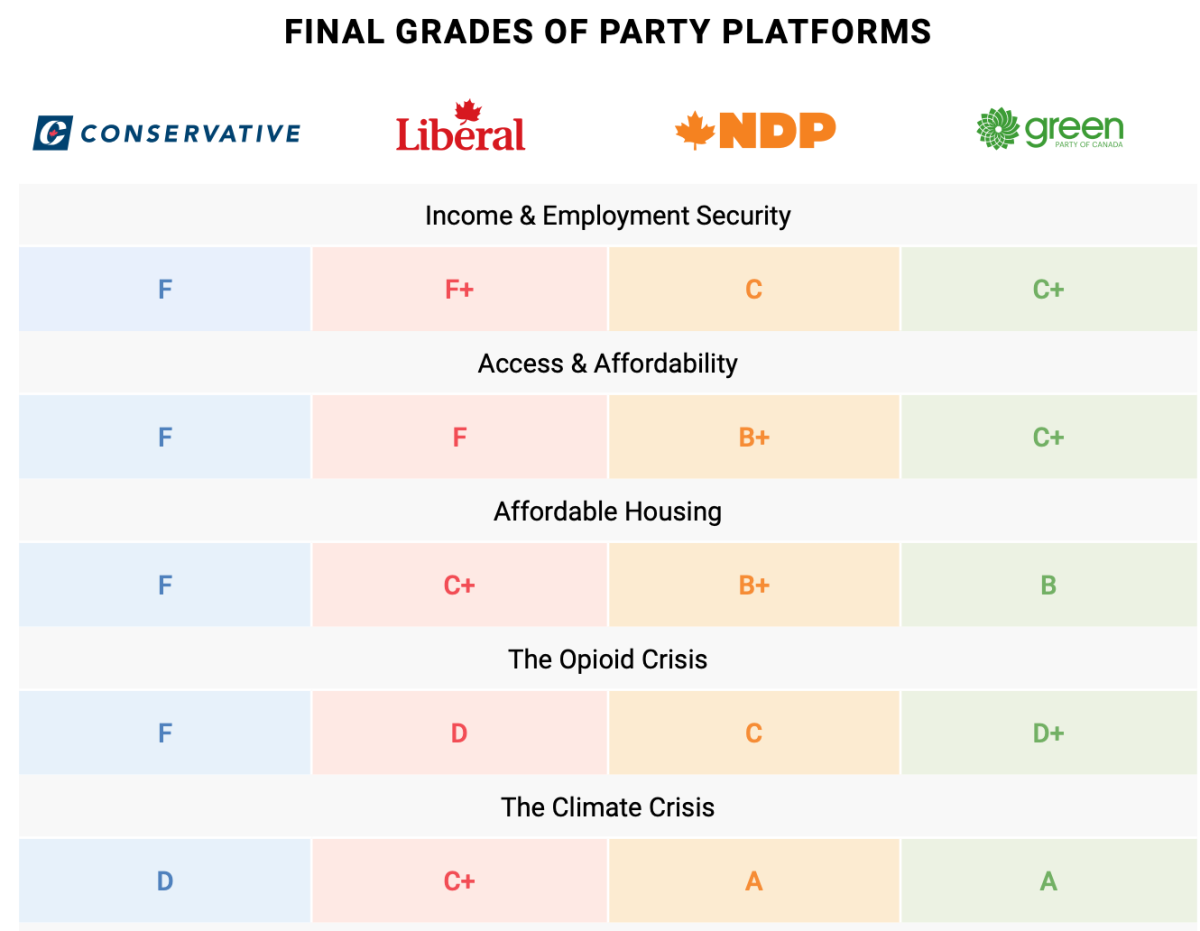A new report is giving the Conservative Party a failing grade when it comes to platform measures to reduce poverty and boost affordability — and the Liberals don’t fare well either.

Health Providers Against Poverty (HPAP) released a report card on Tuesday comparing how the election promises of the four major federal parties would impact the physical and mental health of marginalized and low-income communities across the country.

An estimated 3.2 million to 5 million people in Canada are considered low-income, according to figures from the Parliamentary Budget Office. And the percentage of people living in food-insecure households has remained steady since 2007.

The group used criteria gleaned from researchers and advocacy groups to analyze party platform promises to do with income and employment security, affordable housing, the opioid crisis, overall affordability and other categories. The grading only considers the words in the platforms and not external factors.
- Quebec premier calls on Bloc Québécois to help topple Trudeau government
- NDP to join Bloc in backing Liberals against non-confidence vote
- Via Rail CEO calls 10-hour train delay ‘unacceptable,’ says new evacuation plan in place
- Ethics commissioner will not investigate Boissonnault over ‘Randy’ texts, says the matter is closed
The grading criteria prioritized anti-poverty policy recommendations with specific targets such as expanding federal funding for programs. The report authors looked for some specific policy proposals in the platforms, including implementing a federal minimum wage of $15, creating and funding a national housing strategy that prioritizes vulnerable communities, and extending permanent residency to all migrant workers and refugees who are currently located in Canada.

“Unsurprisingly, no one party achieved a perfect score,” notes the report by HPAP, an alliance of health care providers that aims to reduce health inequality in Canada.
Both the NDP and the Greens received a final grade of B, though the NDP scored slightly higher numerically.

Get breaking National news
The Liberals got a D+ and the Conservatives scored the lowest across all categories.
A spokesperson for the Liberals said in an email that the party “remains committed to reducing poverty by 50% and helping more Canadians join the middle class.”
The spokesperson pointed to the National Poverty Reduction Strategy and the fact that, over the last four years, the Liberal government has reduced rates of poverty by “lifting 900,000 Canadians out of poverty, including nearly 300,000 children.”
Further, a re-elected Liberal government would “help lift more Canadians out poverty and give even more families an equal and fair shot at success.”
The Conservative Party did not respond to a request for comment from Global News.
The report notes that the Conservatives do not have a commitment to establish a universal pharmacare system, while the Liberals have said they will take steps toward implementing one.
Both the NDP and the Greens have full commitments for universal pharmacare.
READ MORE: There are stark disparities in access to mental health services across Canada
On the issue of affordable housing, both the NDP and the Greens have commitments to develop and fund a national housing strategy specifically for some vulnerable groups. The Conservatives don’t have a specific commitment on this, while the Liberals have a national housing strategy, but the report says it does not provide sufficient funding, nor does it specifically target vulnerable groups.
“It is clear that two parties, the NDP and the Green Party, make a priority of eliminating health inequities and social inequities, while the Conservatives and the Liberals make it less of a priority,” Dr. Jon Herriot, HPAP’s co-chair and a family doctor in Toronto who treats people with HIV, said in an interview.
Herriot said he and his group were disappointed in all four parties when it comes to their plans, or lack thereof, on the opioid crisis. The NDP scored the highest, with a C grade, while the Liberals got a D, the Greens a D+ and the Conservatives an F.
READ MORE: More doctors are prescribing opioids to prevent their patients from dying of overdoses
He noted that no party has a detailed proposal to expand access to a safe supply of opioids as a way to help steer people away from the tainted street supply.
“When you look at the platforms, their opioid overdose response platforms are very small and they’re hard to find,” he said. “They’re usually only one paragraph long and often they’re buried in another section.”

Herriot said that the way each party deals with poverty and inequality is important for every voter to consider, regardless of their socio-economic circumstances.
“When I think about what the goal of an elected government is, it’s to make the population healthier, happier. When you look at how a government is promising to treat the most vulnerable, I think that’s a good indication of what their goals are,” Herriot said.
“And the more equal society is, the better you treat the most vulnerable, everyone else, all the way up the socioeconomic ladder, will do better.”
According to public records, a number of HPAP members have made donations to the NDP. This include Herriot. But, he said the group is “very careful not to introduce bias into the grading of our report card.”
He said that the grading in the report is vetted by multiple members.
In 2018, HPAP released a similar report card during the Ontario provincial election that found that the Ontario NDP scored the highest, with a B+, on promises to address the health impacts of poverty. The Green Party of Ontario received a C+ and the provincial Liberals also got a D+. Like the federal Conservatives, the Progressive Conservatives also got an F grade.










Comments